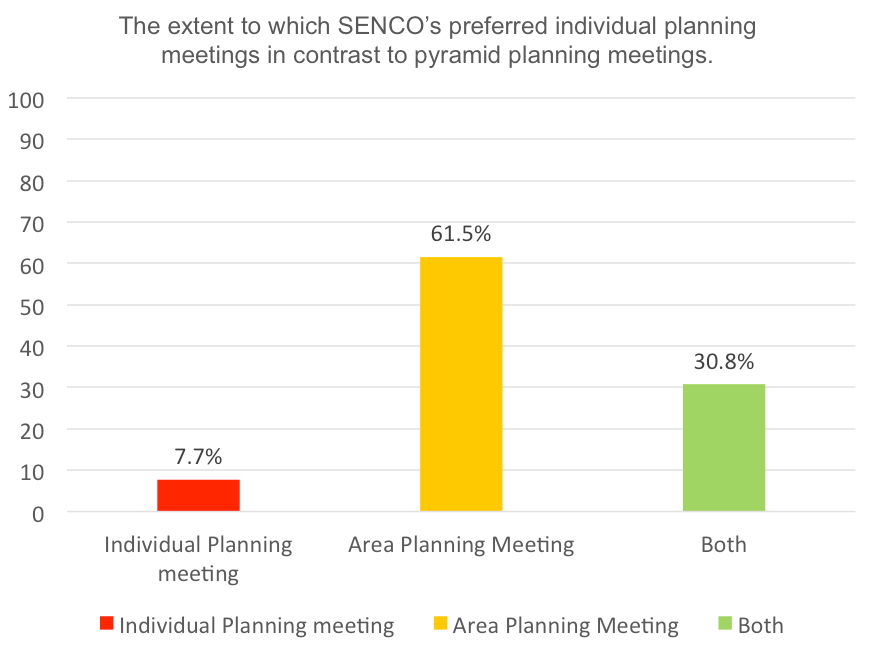In 2019 The Doncaster Educational Psychology Service scratched heads to identify the most effective way to engage with SENCOs to provide the most effective support to our children and young people.
Traditionally Educational Psychologists would attend an ‘individual planning meeting’ with school SENCOs. These meetings enabled SENCOs to explore and problem solve ‘complex’ cases with EPs. This was informed by the extent to which the graduated response had been followed and whether existing provision was making the targeted improvements in outcomes for the child or young person. SENCOs could seek further external support if they were ‘stuck’ in some cases. Planning meetings give us a chance to build relationships with SENCOs (with the added bonus of a biscuit offering).
Working in this way led to many successful outcomes, yet over time a number of barriers had appeared.
Barriers and obstacles from individual planning meetings
Time and capacity
Providing an individual planning meeting to each school was time consuming. We offered planning meetings to each individual school per academic year. This meant 228 individual planning meetings a year, lasting for 1.5 hours – 342 hours or 9 weeks of full time EP work.
Guiding question: How can we use our time in a more effective manner?
Over lapping with other services
We would find that we would overlap with other services e.g. Behaviour Outreach Support Services, Autism Social Communication Education and Training Service, CAMHS etc. Not all services attended nor did we always invite them to our individual planning meetings.
Guiding question: How can we work together with other agencies more effectively?
Lack of sharing best practice
This is not only practice between schools but also practice between EPs. As traditional planning meetings are ‘individual’, other EPs and SENCOs don’t have the opportunity to share practice.
Guiding question: How can we share best practice?
Lack of whole locality development
There was minimal identification of what gaps were present in each local area for Educational Psychologists to support with. We don’t provide consultation for our local areas as a whole but rather individually.
Guiding question: How can we identify ways of working through local areas rather than individual schools?
To understand the solutions and a direction forward, we engaged in a solution-focused approach (De Shazer et al, 1986; George et al, 1993; Ajimal & Rees, 2001) to explore further community psychology and understand how to improve practice.
Proposed solutions
Time and capacity: condense our time.
Overlap with services: invite a range of services to our planning meetings/ consultation.
Lack of sharing best practice: provide the opportunity to share practice with other EP’s and also encourage SENCOs to share practice.
Lack of whole locality development: provide consultation/meetings within a locality rather than individual meetings. This also will affect time and SENCOs, as all within one locality will attend a meeting.
Solutions in practice: Pyramid Planning Meetings (PPM)
To develop the proposed solutions we created Pyramid Planning Meetings. Pyramid Planning Meetings are consultation with an Educational Psychologist that is delivered on a group basis, rather than individual basis. The vision was a range of services and all SENCOs within one pyramid in a local area based in one room.
Pyramids of schools are from the same locality. Each local area within Doncaster (north, east, south and central) has a division of pyramids. So as an example, the east area has four pyramids. All the SENCOs from the feeder primary schools and secondary schools in each area are invited to attend. As well as SENCOs, representatives from other services are also invited to attend which is not always the case at individual planning meetings. This includes Behaviour Outreach Support Service (BOSS), Autism Social Communication Education and Training Service (ASCETS) Child and Adolescent Mental Health Service and the Speech and Language Therapy Service.
During the Spring/Summer of 2019, we ran two pilot Pyramid Planning Meetings. The aim of the pilot was to understand how useful the change in delivery was and what could be changed going forward.
We allocated three hours for the PPM in which we had 13 SENCOs attending either one of the PPM.
Within the Pyramid Planning Meetings, SENCOs could raise cases they needed support with, with the understanding that they had already followed the graduated approach. The whole team would then collaboratively problem solve to best support the child or young person. This would be guided by the application of psychology and our expertise in evidence-based practice. It was hoped that this approach would also encourage SENCOs to share ideas and support one another in these conversations.
The outcome of Pyramid Planning Meetings
We wanted to know what the SENCOs thought about our new model of service delivery. We provided the SENCOs with a questionnaire after the meeting, which enabled us to acknowledge their thoughts in response to the new meeting format.
As a result, SENCOs preferred the pyramid planning meeting to a greater extent (61.5%) than individual planning meetings (7.7%).

To understand SENCOs’ responses, we distributed a questionnaire with the following questions:
- What will you do differently because of this session?
- What has been the most helpful part of this session?
- What are the next steps you will take?
- What do you consider the next steps that the EP will take?
- Do you feel this is a better way of working than an individual planning meeting?
- Why or why not?
- Was there anything else that you would have like to been included?
We analysed SENCo responses using thematic analysis and generated the following themes:
Theme 1: The benefits of the PPM approach
Sharing resources and support – SENCOs found that sharing resources and support was a benefit of this new way of working.
Multi agency support – Working together with other services was recognised as a benefit and from our perspective addressed the ‘overlap’ issue.
Relationship building – SENCOs thought that relationships with other SENCOs could be built and developed. As traditionally they spend little time together, it was amazing to see how groups blossomed towards the end of the session and fed off one another!
Theme 2: The PPM approach providing a direction forward.
Advances in processes –SENCOs were able to recognise the next appropriate step to take in accessing support for children and young people. This included expectations in terms of funding but also greater direction as to what route to go down.
Awareness of next steps for SENCO’s, EP’s, other agencies – SENCOs reported that they were more familiar with what to do next, to help children and young people most effectively.
Theme 3: Concerns and further guidance for PPM development.
Not getting support for all cases – Sharing time with other SENCOs meant that there was less time to discuss as many cases compared to having 1:1 time with an EP. In order to address this the Educational Psychology Service are offering further follow up sessions from September, twice each term to every pyramid. This provides schools with further support around any cases or gaps in learning that need to be developed.
What is available within Doncaster to support practice – Due to the busyness of school life, SENCOs find it hard to be aware of what external support is available to schools. SENCOs felt they would benefit more from this information. In response we want to use the knowledge of the services involved in the Pyramid Planning Meetings to update schools with recent developments. Going forward we will make a conscious effort to provide this support. This is something the EP Service will consider from September 2019.
In terms of time, PPMs and the follow up sessions will consist of 192 hours of EP work (in contrast to 342). Our hope is that this allows EPs to use their time more effectively with the added bonus of SENCO’s preferring this approach.
We have been able to adapt our way of working to meet the needs of a range of educational settings and services including the EPS. We have also been able to reflect on our model based on the feedback from SENCO’s.
If you have any questions about the approach described, then please do not hesitate to get in touch with us. We also have created an impact report that you are more than welcome to read – just let us know.

